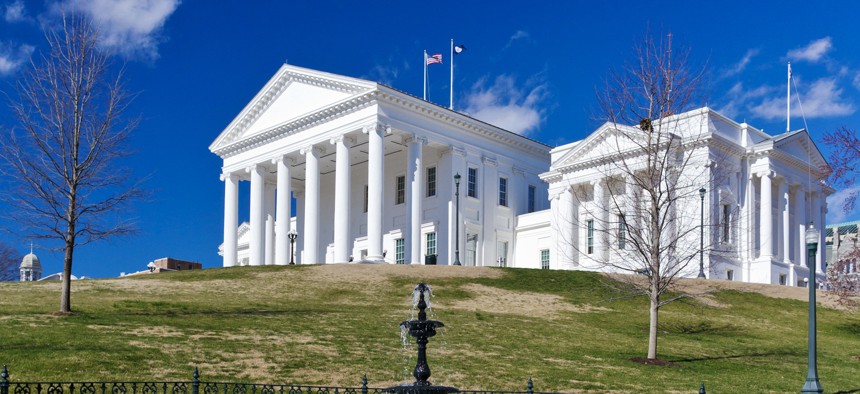The Big Opportunity States Are Missing

State capitol building in Richmond, Virginia. Getty Images/traveler1116
COMMENTARY | State governments are excluding local governments from major policymaking decisions. There needs to be more collaboration and cooperation between states and localities if we want to see meaningful change in our communities.
Too often, state governments across the country have failed to fully integrate local government voices in the dialogue to solve the residents’ problems. The failure to connect local governments with the decisions being made at the state level is borne of the longstanding mistrust between state and local governments. In programs of all sizes, states have lulled (or mandated) local governments into new programs only to pull back what few financial incentives were initially offered.
The failure of states to treat local governments as full partners has economic and social consequences; it means that our leaders aren’t leveraging all the tools in their toolbox to make their states a better place. Not only are state leaders not providing the most appropriate services to our citizens, they also can’t be sure that the services they are providing are the most efficient or economical.
Take our state of Virginia for example. For too long, state leaders, including governors, agency heads and general assembly members have treated local governments as a special interest group, instead of as a full partner in delivering services to citizens. Amazing people work in our local governments: from Big Stone Gap to the Eastern Shore, from Southside to Northern Virginia. These local government workers know what makes their communities tick. They wake up every morning and strive to make their town, county or city a better place, for children to grow, for businesses to flourish and for people from all walks of life to come together. They know how to deliver services and, just as importantly, what services the citizens of our Commonwealth need.
Although more than 60% of the Virginia state budget goes to localities – largely to implement programs and services mandated by the state – the state doesn’t do more to include localities in crafting solutions. Instead, lawmakers all too often adopt a top-down, one-size-fits-all approach that omits local government input, doesn’t work for every locality and falls short of the funding needed to seriously address the issue at hand.
We can—and we must—do better!
There are times when having local governments take the lead makes sense. For example, driving tax collection from state capitols doesn’t make sense given the wealth of local knowledge held by local commissioners of revenues and tax agencies. Moreover, not only do localities know which businesses are flourishing and which ones are floundering, they know when companies move or change names. States should use local knowledge to collect revenues more effectively and do better overall business.
This isn’t to say that there are no successful state and local partnerships. In Virginia, DMV Select, for example, is a successful program in which local governments and private entities contract with the Department of Motor Vehicles to provide select DMV transaction types in a secure environment. Each DMV Select partner has online access to DMV, allowing the partner to update customer records locally in real time and issue decals for vehicles. Last year, DMV Select processed more than 500,000 secure transactions.
Despite scattered successes such as DMV Select, capitalizing on opportunities for local-state collaboration needs to be a priority for state leaders. The question remains: How do we take advantage of this missed opportunity?
Governors can make an immediate difference by taking executive action that requires all state agencies to designate a local government liaison. Governors can also require all state agencies to inventory existing relationships with local governments and evaluate the potential for more. This will help each state agency head and their staff prioritize relationships with local governments.
Governors also should strongly consider when cabinet positions or other appointed positions become vacant, appointing local government officials. Having a local government perspective at the cabinet level would be a game changer in delivering services to citizens.
The potential to create innovations in service delivery through local-state partnerships is too advantageous to ignore. Admittedly, these changes, while easily imagined, will take a sea change of attitude to accomplish. Executive action is the place to start. Governors can create the environment to fully engage local government in helping their states take advantage of this missed opportunity.
Bill Leighty served in Virginia state government for 38 years. He retired after serving as chief of staff to former Govs. Mark Warner and Tim Kaine. Lane Ramsey served Chesterfield County for 38 years, retiring as Chesterfield County administrator. Both are principals in DecideSmart, LLC, a consulting firm based in Richmond.
NEXT STORY: Local Officials to Congress: We Want Stricter Gun Control





